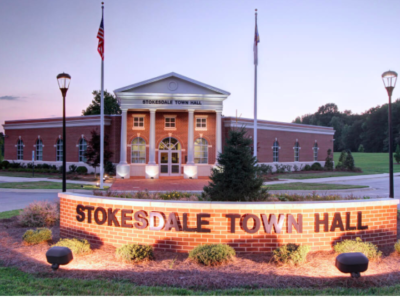One Stokesdale Town Councilmember who’s been objecting fiercely to the way he claims he’s being excluded from town business and intellectual resources has now taken his battle to the NC Attorney General as well as to state legal experts.
Stokesdale Town Councilmember Tim Jones, who objects strongly to a new town attorney access policy and to other recent moves by his fellow councilmembers, has contacted the NC Attorney General’s Office as well as the UNC School of Government in an attempt to find possible recourse.
The small town battle started in July when the Town Council adopted a new policy that Jones – a financial conservative who’s often the lone no vote on that council – said was needless and was adopted to target him and to thwart his ability to get information.
That policy was approved on a 3-to-1 vote on Thursday, July 11 by the Town Council, with Jones as the no vote. The policy requires all councilmembers to address any requests to use the town attorney to the mayor. Before that, Jones and other members of the Stokesdale Town Council were able to contact the attorney and ask their legal questions without asking permission. However, now, all those requests must go through the mayor, who can approve or deny the requests.
Jones said this week that he’s being left out of the town’s information loop in other ways as well because the other council members refuse to communicate with him or share information with him. He said Stokesdale Mayor John Flynt and other councilmembers keep his phone number blocked and don’t respond to his emails. Therefore, he said, he’s unable to request access to the town attorney or get other information he needs to make informed decisions.
Jones said he issued a complaint to the NC Attorney General but he added that he’s not optimistic that office will be able to help. He said that, in initial consultations, he was informed that this matter fell outside the scope of that office.
He also contacted the UNC School of Government – a pool of experts in state law that’s often called on for advice by elected officials in the state.
“My right to participate in the business of the Town of Stokesdale as an elected Councilmember is being illegally restricted,” he wrote in an email to the School of Government.
He also cited the 14th Amendment’s Equal Protection Clause and quoted it in that correspondence: “No state shall make or enforce any law which shall abridge the privileges or immunities of citizens of the United States; nor shall any state deprive any person of life, liberty, or property, without due process of law; nor deny to any person within its jurisdiction the equal protection of the laws”
Jones wrote, “As a laymen I do not believe this policy is legal and I do not believe it is in the best interest of the Citizens of Stokesdale or the public at large. I firmly believe the real intent was to limit my access to the Town Attorney as a Governing Board member.”
Jones said he may now be forced to use a personal attorney to conduct his fight, and he also said that, based on something he learned from the School of Government, he may be able to make another move as well.
He said he learned from a legal expert there that, if the writing from the attorney is addressed to only a portion of the town board – not all – then that writing would likely be subject to disclosure upon request from any party. That is, it would be a public record.
Jones said that, in order to remain informed on town business, he may begin making daily or weekly public records requests of the town to view those communications he feels he’s currently being prevented from seeing.

